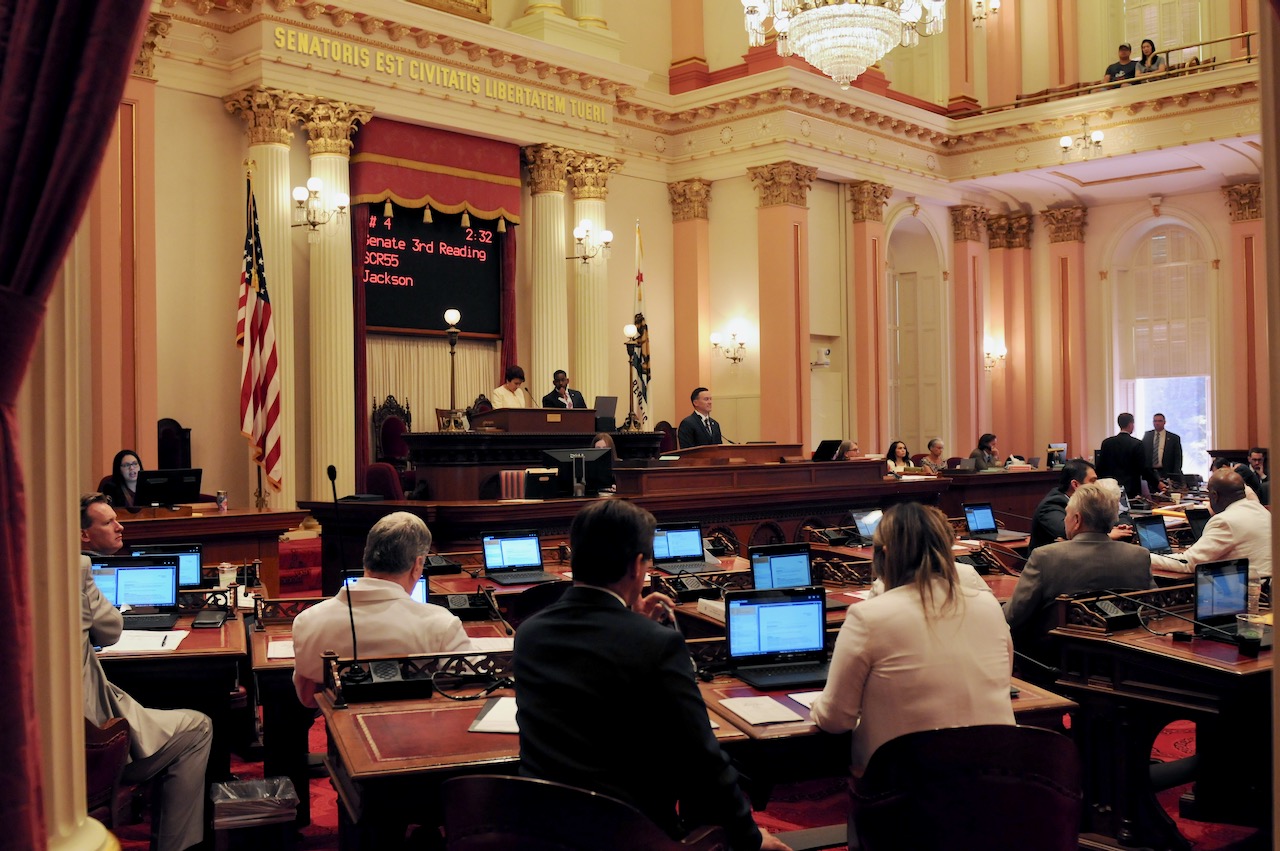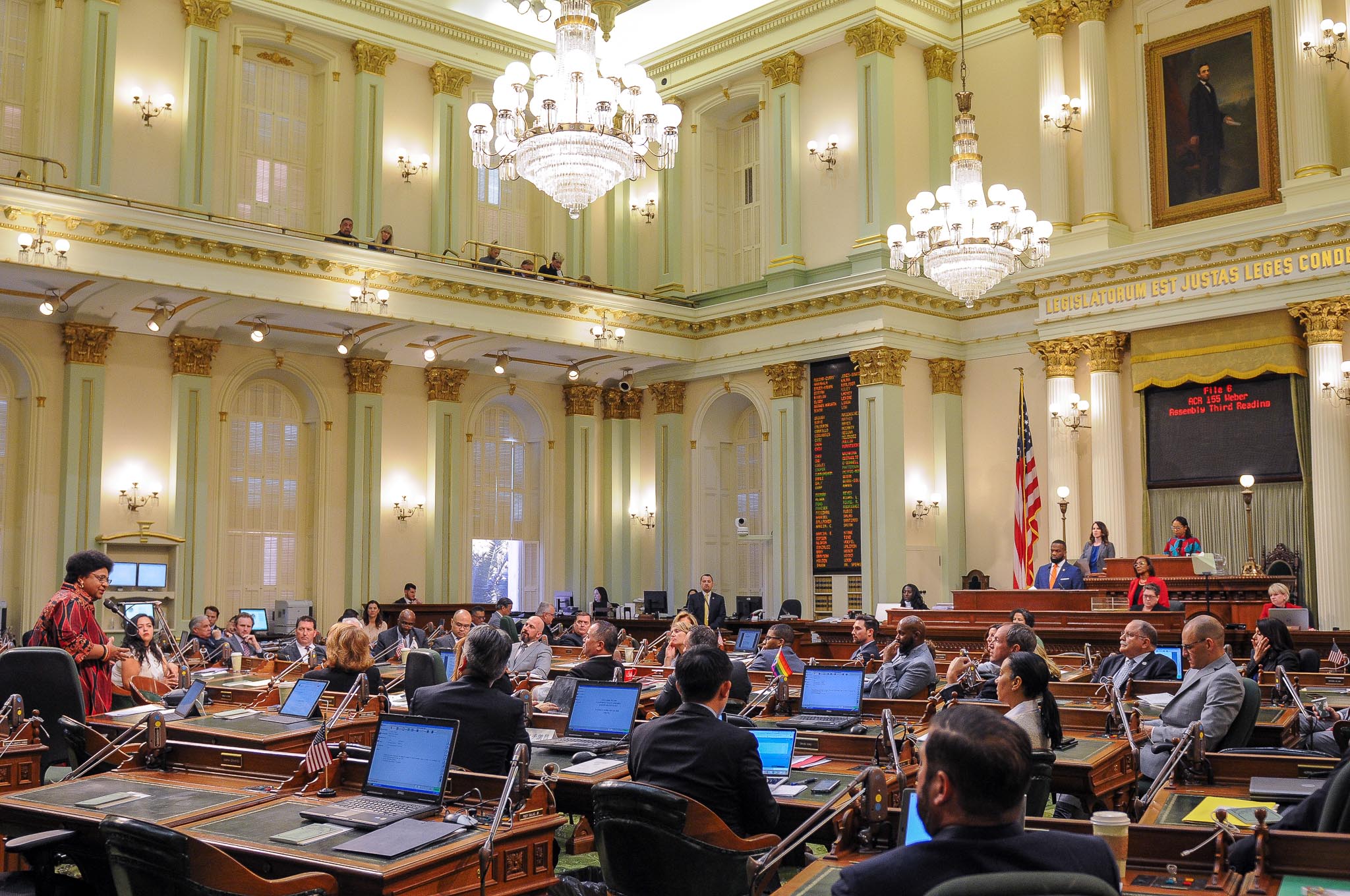
California State Capitol. (Photo: Kevin Sanders for California Globe)
Different Forms of Mandate Disclaimers
Article 13B was added to the State Constitution by Proposition 4 on the November 6, 1979 ballot
By Chris Micheli, October 11, 2023 4:04 pm
Bills in the California Legislature can impose a state-mandated local program, which potentially requires reimbursement by the State of California to local agencies and school districts. The California Constitution requires the State to reimburse local agencies and school districts for certain mandated costs.
Article 13B was added to the State Constitution by Proposition 4 on the November 6, 1979 ballot. It contains fifteen sections, including Section 6, which deals with state-mandated local programs:
Section 6 essentially provides that, whenever the Legislature or any state agency mandates a new program or higher level of service on any local government, the State must provide a subvention of funds to reimburse that local government for the costs of the program or increased level of service, except that the Legislature may, but need not, provide a subvention of funds for the mandates. This applies to a mandate only as it affects a city, county, city and county, or special district.
Section 6(a) specifically provides that the Legislature may, but need not, provide a subvention of funds for the following mandates:
(1) Legislative mandates requested by the local agency affected.
(2) Legislation defining a new crime or changing an existing definition of a crime.
(3) Legislative mandates enacted prior to January 1, 1975, or executive orders or regulations initially implementing legislation enacted prior to January 1, 1975.
(4) Legislative mandates contained in statutes within the scope of paragraph (7) of subdivision (b) of Section 3 of Article I.
In addition, existing state law establishes procedures for making that reimbursement pursuant to Part 7 (commencing with Section 17500) of Division 4 of Title 2 of the Government Code. As a result, if the Commission on State Mandates determines that a bill contains costs mandated by the state, then reimbursement to local agencies for those costs must be made pursuant to these statutory provisions.
The most common example of the state-mandated local program is when a bill expands the definition of a crime, thereby imposing a state-mandated local program. The bill key specifies “yes,” which means that the bill would result in a state-mandated local program or “no,” which means that the bill would not result in such a mandate.
The following are several examples drawn from recent California legislation setting forth the required language that is contained in a bill:
STANDARD DISCLAIMER
Digest Language
By expanding county duties under the program, this bill would impose a state-mandated local program.
The California Constitution requires the state to reimburse local agencies and school districts for certain costs mandated by the state. Statutory provisions establish procedures for making that reimbursement.
This bill would provide that, if the Commission on State Mandates determines that the bill contains costs mandated by the state, reimbursement for those costs shall be made pursuant to the statutory provisions noted above.
Plus Section Language
If the Commission on State Mandates determines that this act contains costs mandated by the state, reimbursement to local agencies and school districts for those costs shall be made pursuant to Part 7 (commencing with Section 17500) of Division 4 of Title 2 of the Government Code.
CRIMES DISCLAIMER
Digest Language
Because a violation of the bill’s requirements by a health care service plan would be a crime, the bill would impose a state-mandated local program.
The California Constitution requires the state to reimburse local agencies and school districts for certain costs mandated by the state. Statutory provisions establish procedures for making that reimbursement.
This bill would provide that no reimbursement is required by this act for a specified reason.
Plus Section Language
No reimbursement is required by this act pursuant to Section 6 of Article XIII B of the California Constitution because the only costs that may be incurred by a local agency or school district will be incurred because this act creates a new crime or infraction, eliminates a crime or infraction, or changes the penalty for a crime or infraction, within the meaning of Section 17556 of the Government Code, or changes the definition of a crime within the meaning of Section 6 of Article XIII B of the California Constitution.
LOCAL LEVIES DISCLAIMER
Digest Language
By imposing additional duties on local officials, the bill would impose a state-mandated local program.
The California Constitution requires the state to reimburse local agencies and school districts for certain costs mandated by the state. Statutory provisions establish procedures for making that reimbursement.
This bill would provide that no reimbursement is required by this act for a specified reason.
Plus Section Language
No reimbursement is required by this act pursuant to Section 6 of Article XIII B of the California Constitution because a local agency or school district has the authority to levy service charges, fees, or assessments sufficient to pay for the program or level of service mandated by this act, within the meaning of Section 17556 of the Government Code.
- Regulating Sales of Franchises - February 11, 2026
- What Is a ‘Loophole’ in California Tax Laws? - February 10, 2026
- Ecological Reserves - February 10, 2026




